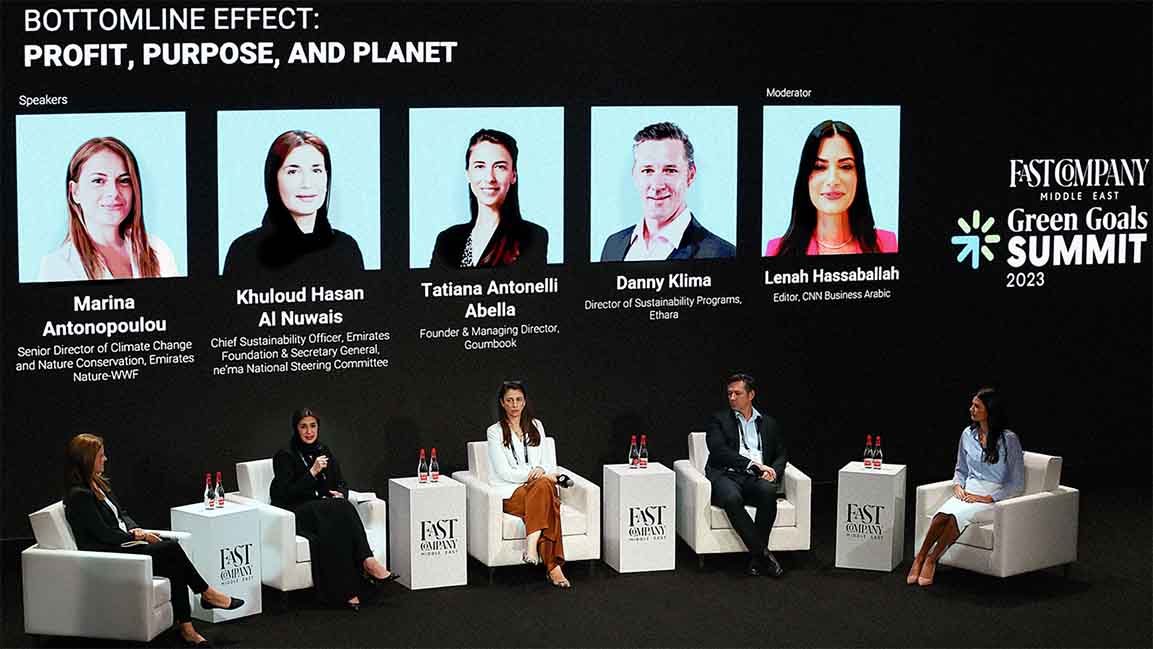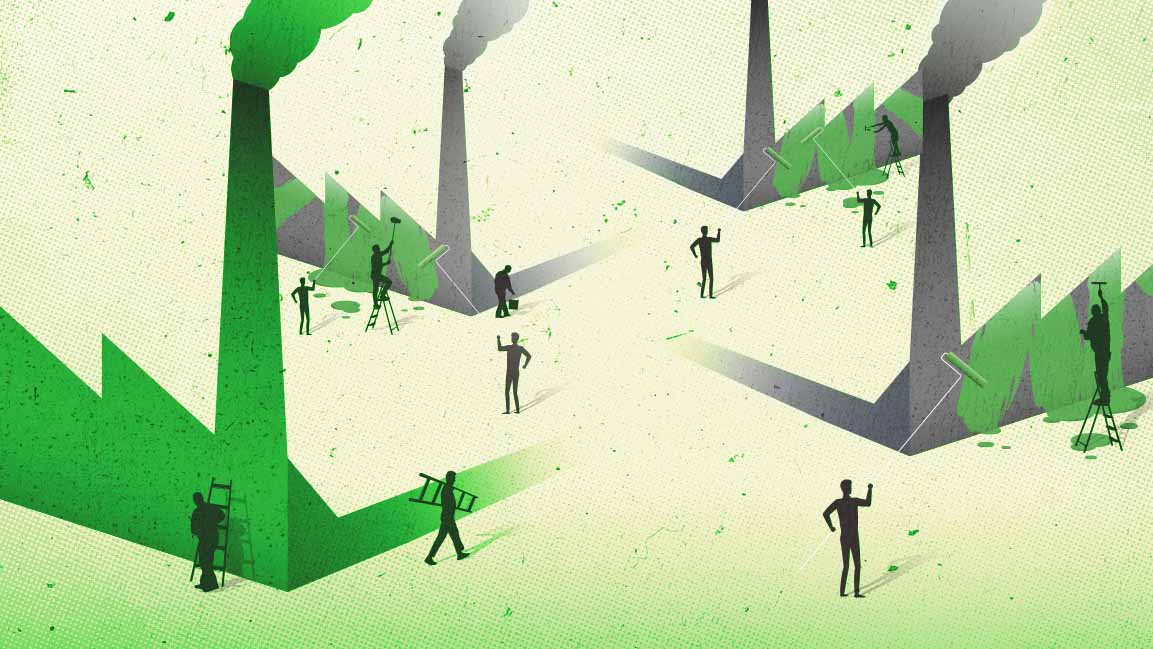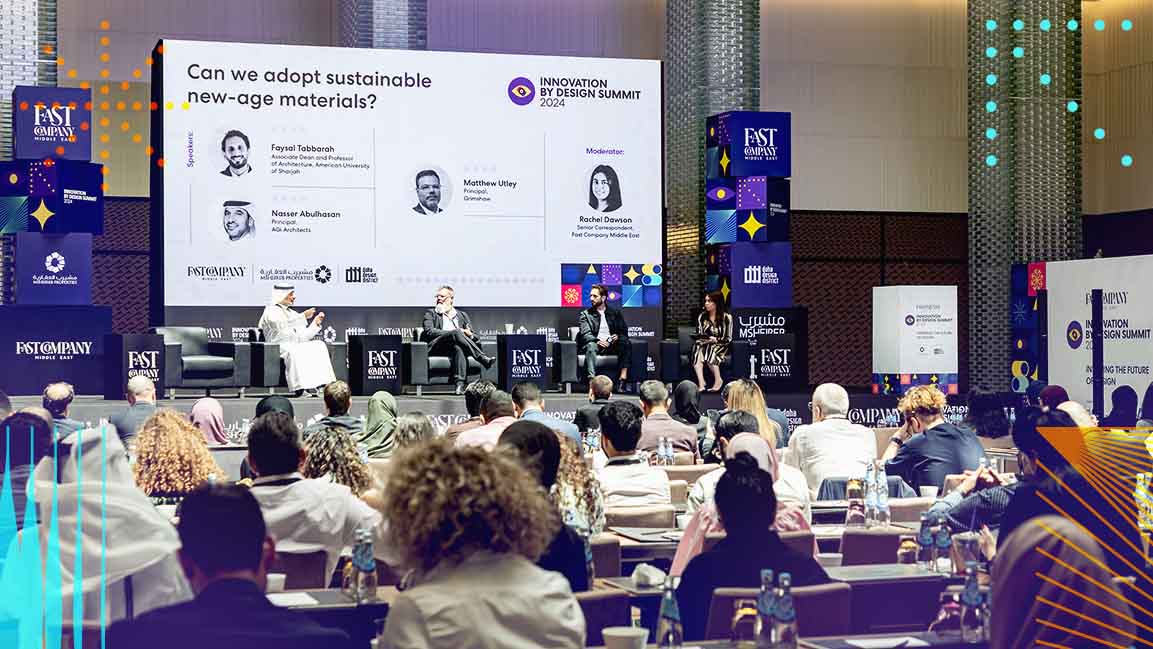- | 2:00 pm
Sustainability is sustainable when everyone is involved
Experts at the second edition of the Green Goals Summit ignited a sense of urgency, urging prompt action to amplify sustainability.

As global warming accelerates alarmingly, addressing climate change is increasingly urgent. In response to this critical challenge, the second edition of Fast Company Middle East’s Green Goals Summit at the Museum of the Future in Dubai on November 2 served as a platform for experts to share adaptive ideas, strategies, and frameworks to amplify impact.
Bringing together the region’s foremost innovative policymakers, business leaders, and government officials in the field of sustainability, the overall echoing sentiment was clear: change must begin with everyone playing their part in responsibility.
From highlighting the urgency of climate action to developing a solid business case for sustainability to identifying the roadblocks to transitioning to a net-zero economy, experts unanimously concurred that taking tangible action is the way forward.
Here are a few takeaways from the summit:
SWIFT AND INFORMED ACTION
What will life be like in 2050? Would we have hit our climate targets by 2030? Amid noble efforts and campaigns by enterprises, H.E. Abdulla Al Nuaimi, former Minister of Climate Change, highlighted serious missing links.
He emphasized the need for swift and informed action, pointing out that the majority of promises made by enterprises in sustainability remain largely unfulfilled due to a critical oversight – neglecting the importance of enlightenment alongside mitigation and adaptation.
Despite the commitments made during the Paris Agreement, the $100 billion annual funding promised for developing countries has fallen short, the former minister said. “We’ve overlooked critical aspects in our pursuit of sustainable solutions.”
He highlighted that the Paris Agreement, while aiming to reduce global temperatures, needed a clear path toward achieving a net-zero status.
“It is clear that we are not on the right path. If we incorporate enlightenment alongside mitigation and adaptation strategies, we can begin to address the environmental challenges effectively. For true sustainability, we must ensure that the next generation is well-informed about the future and the urgent need for collective action,” Al Nuaimi said.
Despite the sobering reality presented by Al Nuaimi, Dr. Mariet Westermann, Vice-Chancellor of New York University Abu Dhabi, emphasized that it’s “never too late to embark on a journey of climate stewardship.”
Citing a deluge of disheartening monthly reports chronicling the devastating impacts of global warming, she said, “Humanity is gradually aligning with the actions needed to combat climate change.”
“Increasing demand for sustainable solutions and the unwavering enthusiasm of young people, who advocate for tangible change, are among the beacons of hope. Their collective energy propels us toward a more sustainable future,” Dr. Westermann added.
COLLABORATION IS ESSENTIAL
Investment in digital and high-tech solutions will be essential in the climate crisis. To ensure economies of scale, Dr. Hamid Haqparwar, Managing Director of BMW Middle East, said, “Collaboration is essential.” Citing an example of the wider adoption of electric vehicles, he outlined how it’s not just about manufacturers providing EVs but the machinery, including charging infrastructure, government regulations, and, ultimately, the consumer’s choice. “Over time, the price points will decrease. Historically, being climate-friendly often meant spending more, but the future holds the promise of affordability, leading to a critical tipping point,” he added.
Another panelist, Buddhi Paranamana, Director of Sustainability & Innovation at PDS Limited, emphasizes the pivotal role played by the Paris Agreement in catalyzing efforts towards addressing climate change. “The challenge now lies in charting a course correction and identifying the key actors that will take the initial steps,” he added.
According to UN Climate Action, approximately 25% of the greenhouse gas emissions come from land clearing, crop production, and fertilization, with animal-based food contributing quarters of that number.
Addressing the audience, Professor Derya Baranm, Co-Founder and Chief Engineer Officer of RedSea, shed light on the current unsustainability of the agricultural system. She highlighted the significant environmental cost associated with producing fresh produce in the area, where over 70% of the region’s precious freshwater resources are utilized for agriculture, often unsustainable.
To address this issue, she advocates adopting climate-controlled agricultural practices, particularly relevant in hot climate regions like the Middle East. “Adaptation technologies are the way to go. We have many things to do, but it starts with focusing on simple solutions that can reach billions of people,” said Baran.
SUSTAINABILITY CAN’T BE THE LOOKOUT OF ONE PERSON
How can businesses integrate nature into daily operations? Often overlooked, climate change poses a real economic threat that could end up costing us 11-14% of the global gross domestic product by mid-century, according to Earth.Org.
Emphasizing the E of ESG, Marina Antonopoulou, Senior Director of Climate Change and Nature Conservation, Emirates Nature-WWF, said that while sustainability falls within the CSR category, most are unaware of its returns. “Companies are unaware of the risks they’re exposed to. Water, for instance, is required for manufacturing across the board. There are many challenges and data limitations, but the cost of doing nothing is worse.”
For true change within organizations, Tatiana Antonelli Abella, founder and Managing Director of Goumbook, said that sustainability cannot be the lookout of one person within the company. “Sustainability cannot just have a director or manager; it’s unfair to put the responsibility on them. It needs to start not just from the CEO, but everyone needs to be on board.”
For a transition from an oil and gas country, the culture of sustainability needs to be embedded into businesses.
An entity looking into integrating sustainability in the events industry, Ethara, part of the panel, highlighted how sustainability comes with a heavy price tag and how collaborations were key to making sustainable ambition into climate action.
“If leadership is not involved in tackling the problem, investments are not made. At the event level, we’ve seen simple choices like a diesel or bio-diesel generator make a big difference,” said Danny Klima, Head of Sustainability Ethara.
Agreeing with Klima, Khuloud Hasan Al Nuwais, Chief Sustainability Officer, Emirates Foundation and Secretary General, ne’ma National Steering Committee, spoke about the importance of partnership within the food security industry. “We work with all sectors across the supply chain to ensure we create the right solutions to tackle food waste in a sustainable, efficient, scalable manner.”
“When we’re wasting food, we’re wasting the water and the labor that has gone into the production of the food,” she added.
Overall, 8-10% of the carbon footprint is attributable to food waste, which is why all actors must come on board to exchange ideas on tackling the issue innovatively.
THE PACE OF ENERGY TRANSITION IS SLOW
The energy transition is necessary and an opportunity to forge a brand-new economic model. When speaking of energy security in the Middle East, experts agree the pace has been slow.
According to panelist Sarah Jaber, Sustainability Lead at AESG, there is a critical need to reduce our reliance on fossil fuels and make sustainability “mainstream.”
Recent research, such as the report by the International Energy Agency, underscores the urgency of reducing our dependence on fossil fuels to combat climate change. Additionally, the increasing frequency and severity of extreme weather events, as documented by organizations like the Intergovernmental Panel on Climate Change, make it evident that climate adaptation strategies are essential.
Another panelist, Tania Zepeda Luna, Chapter Lead at Women in Renewable Energy UAE, said, “Current energy systems are fragile.”
She highlighted the importance of clean energy as a reliable and sustainable alternative.
For Kivanc Karayol, Market Director and Head of Electromobility and Sustainable Growth for the Middle East and Turkey at Volvo Group, energy security has moved up the public agenda. “In the commercial auto industry, inflation has not been limited to internal combustion engines, which has affected prices in a big way.”
The future poses multifaceted challenges and opportunities for sustainable and secure energy systems. As the world grapples with climate change, energy security, and economic stability, these voices from the industry provide valuable perspectives for shaping a more sustainable and resilient future.








































